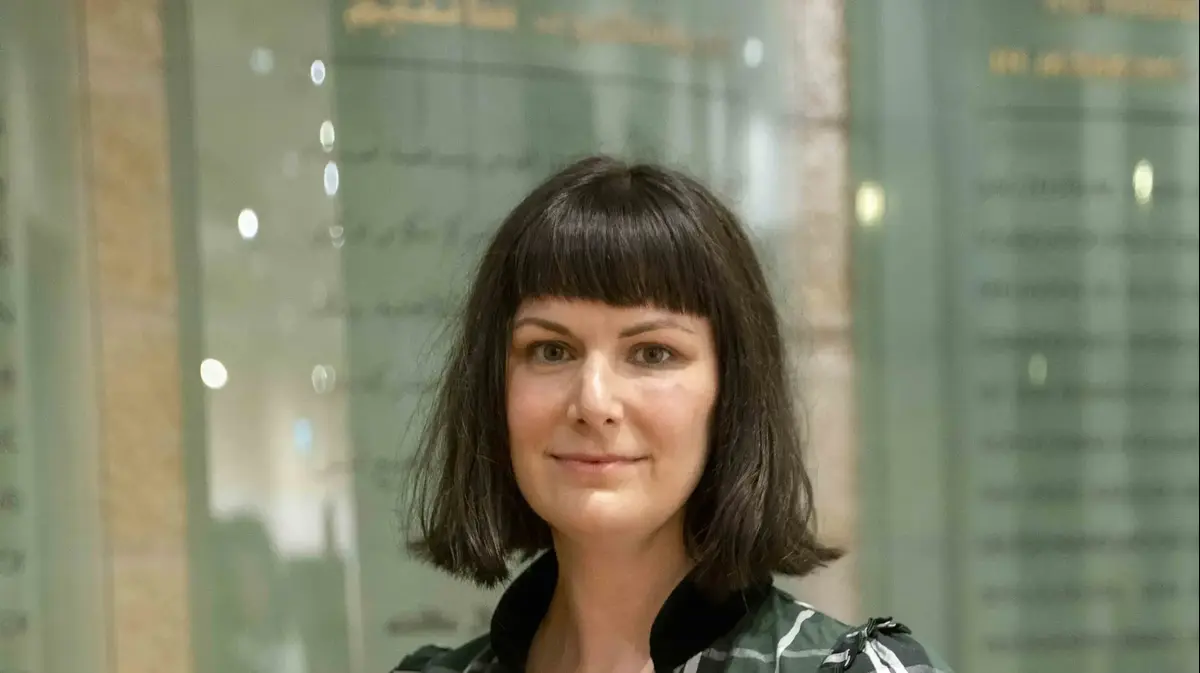"Israelis continue to go on as usual between the sirens, and that's admirable." Julia May Jonas (Photo: Adam Sternberg)
Last week, American author Julia May Jonas visited the Mishkenot Sha'ananim Writers Festival and spoke with the audience about "Vladimir," her much-talked-about, acclaimed and excellent debut novel. Being in Israel during this period taught her two things. The first lesson: what it's like to live under alarms. "So many people have said to me in the past week, 'Welcome to Israel, that's how life is here,'" she says in an interview with Walla! Culture, which takes place just before her flight back to New York. "I got the impression that people here are able to carry on with their lives as usual, and I find that admirable."
The second lesson was of a completely different kind: "I learned that relative to Americans, Israelis are much more comfortable with conversations around sex. They are much less PC," declares the author, whose novel was published by Penn, with an excellent translation by Sharon Preminger. "The American discourse is hesitant. People are always afraid to say something wrong. Here, the feeling is that it's a little easier to talk about these things."
"MeToo is a broad concept that is used too much." Julia May Jonas at the Mishkenot Sha'ananim Festival (Photo: Chen Wagshel)
"Vladimir" invites a slew of challenging conversations about sex. This is already evident in his name, which corresponds with Vladimir Nabokov, author of the controversial "Lolita". This is also evident in his cover, which features a naked man, and this is especially evident in his plot. Here Jonas tells the story of a literature professor at a small college on the East Coast. Her boyfriend was the head of the department where she teaches until he was suspended for having affairs with some of his female students. Since the relationship was consensual, the nameless heroine supports him and complains mainly to his students.
At the same time, the heroine has a turbulent life of her own, and she develops an obsession with a new character on campus: a young and attractive lecturer named Vladimir. The age gap between them doesn't bother her, not even the fact that he's married.
The book was rightly acclaimed, and received extensive media coverage. In the spirit of the times, many reviews have labeled it a "MeToo book", as if it were a genre in itself. "The book doesn't mention MeToo, which I think is too broad, too widely used," she says. "I'm always suspicious of language becoming generic, and even banks use it. It's good for marketing, but not for anything else. Over the years, there have been many books and movies about authority relations in the university and workplaces, and they came out long before MeToo. Once you label the book that way, it means there's something I have to agree with or disagree with, so I don't encourage that labeling."
Speaking of consent - what is your position on consensual affairs between professors and students? At least according to the book, this is a complex position.
"I deliberately presented consensual relationships so that the discussion would be in a gray area. There was no assault or harassment here, so it's not black and white. When I was a student, novels like this were quite acceptable. In my view, it's good that these things don't happen anymore, and a professor doesn't have to go out of his way to sleep with female students. What bothers me is that they came to these students after they slept with a lecturer on their own initiative and told them that it hurt them. I don't like policing sexuality and certainly don't like how it developed. You used to be told that you were bad if you had sex, and now they say that if you have sex it hurts you. I don't like it when sex is portrayed as a bad thing. It's a way to police women's sexuality."
More in Walla!
The man messes with female students, the wife does not put her hand on the plate: read the first chapter of "Vladimir"
See full article >
An excellent book with great translation. The cover of "Vladimir" (Photo: Design: Talia Bar)
It is said that professors who look good have higher enrollment and better teaching surveys. How do you explain it? Why does the human brain decide that if someone looks good, they are also smarter?
"My answer might make some discounts for male and female students. You have to remember that they live on campus. Campus is their life, and they have no other life. They develop intellectually, but also emotionally, they learn what they feel and who they love. However, of course I don't think there should be any prejudice in favor of professors who look good."
At one point, the book describes Vladimir's penis in a particularly unwelcoming way. I wondered why this was important.
"I felt something disappointing had to be discovered about it, and the size of the organ provides that effect. The book definitely objectifies Vladimir, I did it as part of an attempt to see if it was possible to reverse the male gaze on his face, and if it was possible to write a book from the point of view of the female gaze."
What is the female gaze in literature?
"Good question. Greek drama instilled the idea that characters must bring tragedy upon themselves, and that idea symbolizes a male gaze to me, so I wanted to undermine it. It was also important to me that the heroine be active. Her life doesn't just happen to her. The story is about what she wants and what she desires. It's constantly in action."
"It's an interesting question, because I don't know the answer." Julia May Jonas (Photo: Chen Wagshel)
In what sense would the book differ if it were not about Vladimir, but from his point of view?
"It's an interesting question, because I don't know the answer. At one point, I tried to check the answer. I wrote a few pages from Vladimir's point of view, but everything I wrote was much less powerful than the heroine's perspective, preferring to stay in her voice all the time. I think Vladimir is aware of the power he has over the heroine, but he doesn't realize how excited she is about him. She sees him as a rock star, but I don't think he sees himself that way. He's much more humble and a lot less pleased with himself than she thinks."
I don't ask what you think of Nabokov's "Lolita" and whether and how it should be taught and studied, because the truth is that this discussion is already exhausting.
"Although in the end the book doesn't deal with that, one of the reasons I started writing is my students' obsession with questions of representation and biography. Before reading a book, they first make sure that the biography of the author is clean - that he was a good person. Beyond that, there is also the automatic disqualification of books because of their subject, without bothering to read them. Anyone who reads Lolita closely, even just a little closely, understands that the author is not on the side of the man who falls in love with a minor. These disqualifications damage our breadth, and it's not good not to know things."
Cancel or not cancel? Vladimir Nabokov (Photo by Getty Images, keystone)
Jonas is in her early forties. Before "Vladimir," she wrote plays, went to college and lived with her family in New York — away from the spotlight. According to her, she did not anticipate the success of the book and was not prepared for the publication that landed on her.
Among the many articles written about the book in the American media, there was also an article in the New York Times that claimed: Vladimir portrays teaching on campuses as a nightmare from hell. I ask Jonas if she agrees with this sentiment.
"I disagree. I haven't taught in the past year, and I miss it," she says. What's interesting about the teaching experience is that you meet all kinds of characters and characters. I learned a lot from this about human nature. I had a student who I still think about, all the time. She resisted everything I said and did, and she had charisma, so she swept the whole class against me."
"This student became my nemesis, and at some point I realized how absurd it was that I turned a 22-year-old girl into a nemesis. It was interesting to see how my feelings developed in front of her. I've never met a person like that and I've never been in a situation like this. Sometimes I wonder where she is today and I'm almost tempted to check, but I stop myself. Maybe one day she'll be famous and then I'll know what's going on with her even without my own research."
Have you heard comments about the book from students?
"One student said to me, 'I know there was a lot of discussion around the book.' 'Discussion' is the code word in America to say that students had strong responses, but I didn't get them directly. I can imagine what those reactions were."
View this post on Instagram
A post shared by Natalie Portman (@natalieportman)
A lot of books these days are becoming streaming series, and there are also a lot of campus series lately, so I wondered if you wrote the book thinking it would become a series.
"I wrote this story as a book so I wouldn't have to write it as a series. Let me explain what happened: I used to write plays, but then COVID came and the theater stopped, so I had to write something else. I was told that financially the most productive would be to write a series, but I said to myself - I would probably invest so much time and energy in writing a pilot, but the chances of the script actually becoming a series are so slim. This thought depressed me, so I had no motivation to write a series, and writing a book was the solution. However, I will not deny that there are plans to adapt the book into a series."
My guess: a British actor will play Vladimir.
"How did you know? All the names that have come up so far have been British - or Australian. If an American actor plays Vladimir, it will be too easy for the heroine to decipher him, and he must be someone she can't easily see."
"Vladimir" / Julia May Jonas. From English: Sharon Preminger. Penn Publishing, 296 printed pages.
- culture
- literature
- Literary News
Tags
- Yedioth Books
- Vladimir Nabokov


/cloudfront-eu-central-1.images.arcpublishing.com/prisa/LWDVUVTJDJHNBCBLJKNGLR3PSA.jpg)






